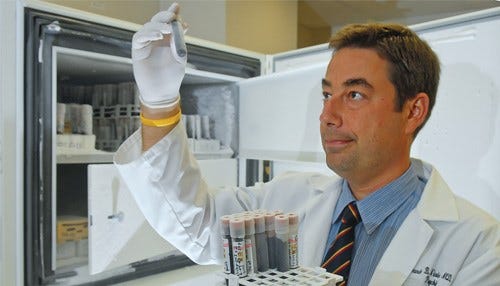PTSD Blood Test Aims for Commercialization
 Niculescu has developed similar blood tests to predict suicide risk and measure pain.
Niculescu has developed similar blood tests to predict suicide risk and measure pain.
Subscriber Benefit
As a subscriber you can listen to articles at work, in the car, or while you work out. Subscribe NowPosttraumatic stress disorder (PTSD) may seem an obvious diagnosis for combat veterans, but the condition can lurk in dark corners for others not commonly screened for it, such as victims of abuse, violence or accidents. Indiana University School of Medicine Professor of Psychiatry Dr. Alexander Niculescu says some veterans view PTSD as a weakness and avoid admitting symptoms. Aiming to take the ambiguity out of the disorder, Niculescu has created a blood test to detect and measure the severity of PTSD—using science to eliminate stigma and save those who slip through the cracks.
Niculescu says doctors currently rely on their “clinical impressions” to diagnose PTSD after asking patients questions about their thoughts, feelings and presence of symptoms. Despite years of treating patients, the method makes Niculescu uneasy.
“In cardiology, for example, when someone comes in with chest pain, we don’t just rely on their self- report of the chest pain; we do a blood test and enzyme panel…to really assess the severity of symptoms,” says Niculescu. “We need a more objective way of measuring the severity of [PTSD] symptoms; not just relying on what people are reporting…or our impressions as clinicians. We want to enable precision medicine in psychiatry, like other fields in medicine.”
Niculescu likens the PTSD blood test he’s developed to the common PSA blood test for prostate cancer, which detects high levels of prostate-specific antigen (PSA). Similarly, Niculescu’s research has identified a series of biomarkers related to stress; his test measures the level of these molecules, which can change over time. While everyone is born with these biomarkers, Niculescu says people who are developing PTSD or already suffering from the disorder have a higher level of these biomarkers in their blood. He says the test would provide an objective method to detect PTSD, which is currently under-diagnosed.
“If an individual is seen by a mental health practitioner, because there’s not that obvious history of being in combat or some dramatic event, they sometimes don’t get asked about the symptoms of PTSD, and hence, the diagnosis gets missed,” says Niculescu. “So a lot of people live with the symptoms and self-medicate with alcohol and other things.”
More than just detecting the biomarkers, Niculescu says the blood test can also measure how active the molecules are, which would tell a clinician the severity of the symptoms in each patient. Niculescu believes it’s life-saving information, because “full-blown” stress disorders are often linked to addictions and suicide.
“When our patients hear about this [research], they tell us if there was a biological test [like this], they would feel much better about coming to terms with their disease and seeking treatment, because they would realize it’s not all in their head. It’s not a weakness,” says Niculescu. “By showing them [PTSD] is a biological illness like having diabetes—you have some biochemical abnormality that can be treated and corrected—you remove the stigma and give them hope.”
Niculescu says the profile of heightened biomarkers in the blood will point clinicians to the correct drug for each patient: “this way, you’re moving toward personalized and precision medicine.” The blood test could also indicate if a person is responding to treatment by tracking changes in the biomarkers; a decrease would show treatment is working. In general, better understanding the biology of PTSD could uncover new treatments, and ultimately, open the door to prevention.
“Markers can sometimes show years in advance if someone is at risk; you could conceive of using them as a screening test,” says Niculescu. “Knowledge is power. If you know you’re at risk of [stress disorders], you can avoid scenarios that would trigger the full-blown illness. You can prepare for them by developing better coping tools, resilience training or receive medications to mitigate it.”
Niculescu’s work extends beyond PTSD; using the same method of identifying molecular signatures, he’s developed similar blood tests to predict suicide risk and measure pain, which could help battle the opioid crisis. He’s working toward commercialization with the IU Research and Technology Corp., and a startup currently “in stealth mode” has licensed his portfolio of PTSD, pain and suicide blood tests—he says an announcement is coming in a matter of weeks.
“We look at this as a comprehensive way of assessing people who might be suffering…improving quality of life and saving lives by preventing suicide,” says Niculescu. “That’s very meaningful to me as a clinician—improving the quality of care, alleviating suffering and saving lives. In the end, that’s what medicine is all about.”
Niculescu says using blood tests to identify stress disorders and measure pain will make the field of psychiatry more objective like other areas of medicine, and ultimately, help prevent suicide.
Niculescu says the PTSD blood test could, ultimately, be used as a screening tool.
